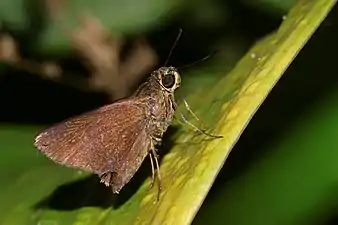Baoris farri
Baoris farri, commonly known as the paintbrush swift,[1] is a butterfly belonging to the family Hesperiidae. It is found in India.[1][2][3]
| Paintbrush swift | |
|---|---|
 | |
| In Kadavoor | |
| Scientific classification | |
| Kingdom: | |
| Phylum: | |
| Class: | |
| Order: | |
| Family: | |
| Genus: | |
| Species: | B. farri |
| Binomial name | |
| Baoris farri (Moore, 1878) | |

Description

Male and female. Upperside ferruginous-brown, base of both wings olive-brown; cilia yellowish-cinereous: forewing with two pale semi-diaphanous spots at end of the cell, and a discal recurved series of seven spots, the four upper and the seventh smallest, the upper three being contiguous and obliquely before the apex, the sixth below end of cell and the largest. Underside greyer brown in the female: forewing marked as in male, except that the lowest spot is more diffused : hindwing without spots.
Larvae are known to breed on Ochlandra travancorica, Ochlandra scriptoria, Bambusa striata and Bambusa wamin.[5]
References
- R.K., Varshney; Smetacek, Peter (2015). A Synoptic Catalogue of the Butterflies of India. New Delhi: Butterfly Research Centre, Bhimtal & Indinov Publishing, New Delhi. p. 58. doi:10.13140/RG.2.1.3966.2164. ISBN 978-81-929826-4-9.
- W. H., Evans (1949). A Catalogue of the Hesperiidae from Europe, Asia, and Australia in the British Museum. London: British Museum (Natural History). Department of Entomology. pp. 448–449.
-
 One or more of the preceding sentences incorporates text from a work now in the public domain: Swinhoe, Charles (1912–1913). Lepidoptera Indica. Vol. X. London: Lovell Reeve and Co. pp. 297–299.
One or more of the preceding sentences incorporates text from a work now in the public domain: Swinhoe, Charles (1912–1913). Lepidoptera Indica. Vol. X. London: Lovell Reeve and Co. pp. 297–299.
-
 One or more of the preceding sentences incorporates text from a work now in the public domain: E. Y., Watson (1891). Hesperiidae Indicae : being a reprint of descriptions of the Hesperiidae of India, Burma, and Ceylon. Madras: Vest and Company. p. 44.
One or more of the preceding sentences incorporates text from a work now in the public domain: E. Y., Watson (1891). Hesperiidae Indicae : being a reprint of descriptions of the Hesperiidae of India, Burma, and Ceylon. Madras: Vest and Company. p. 44.
- Kalesh, S & S K Prakash (2007). "Additions of the larval host plants of butterflies of the Western Ghats, Kerala, Southern India (Rhopalocera, Lepidoptera): Part 1". J. Bombay Nat. Hist. Soc. 104 (2): 235–238.